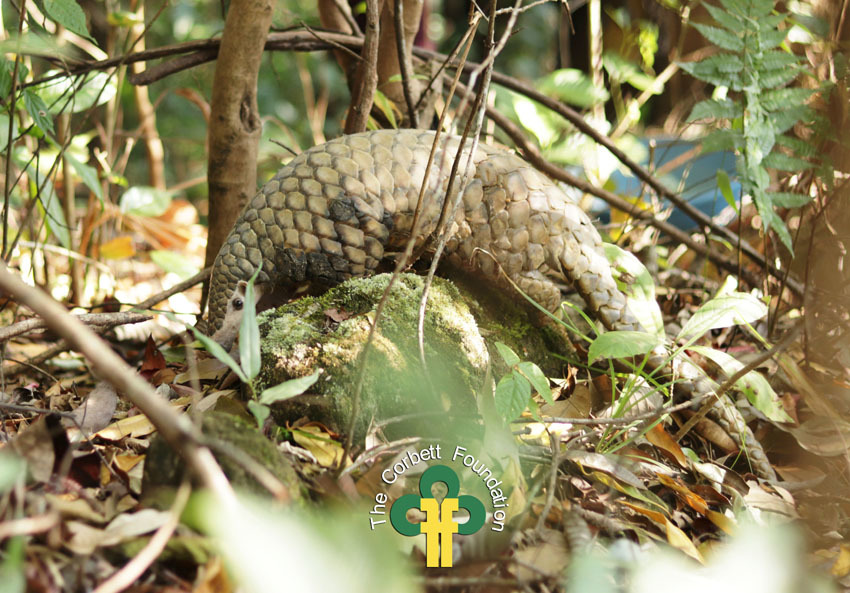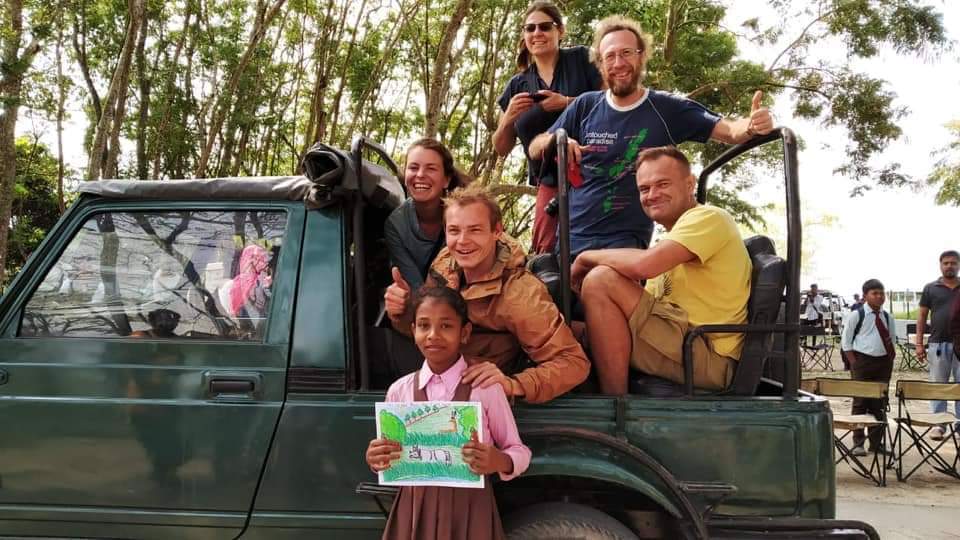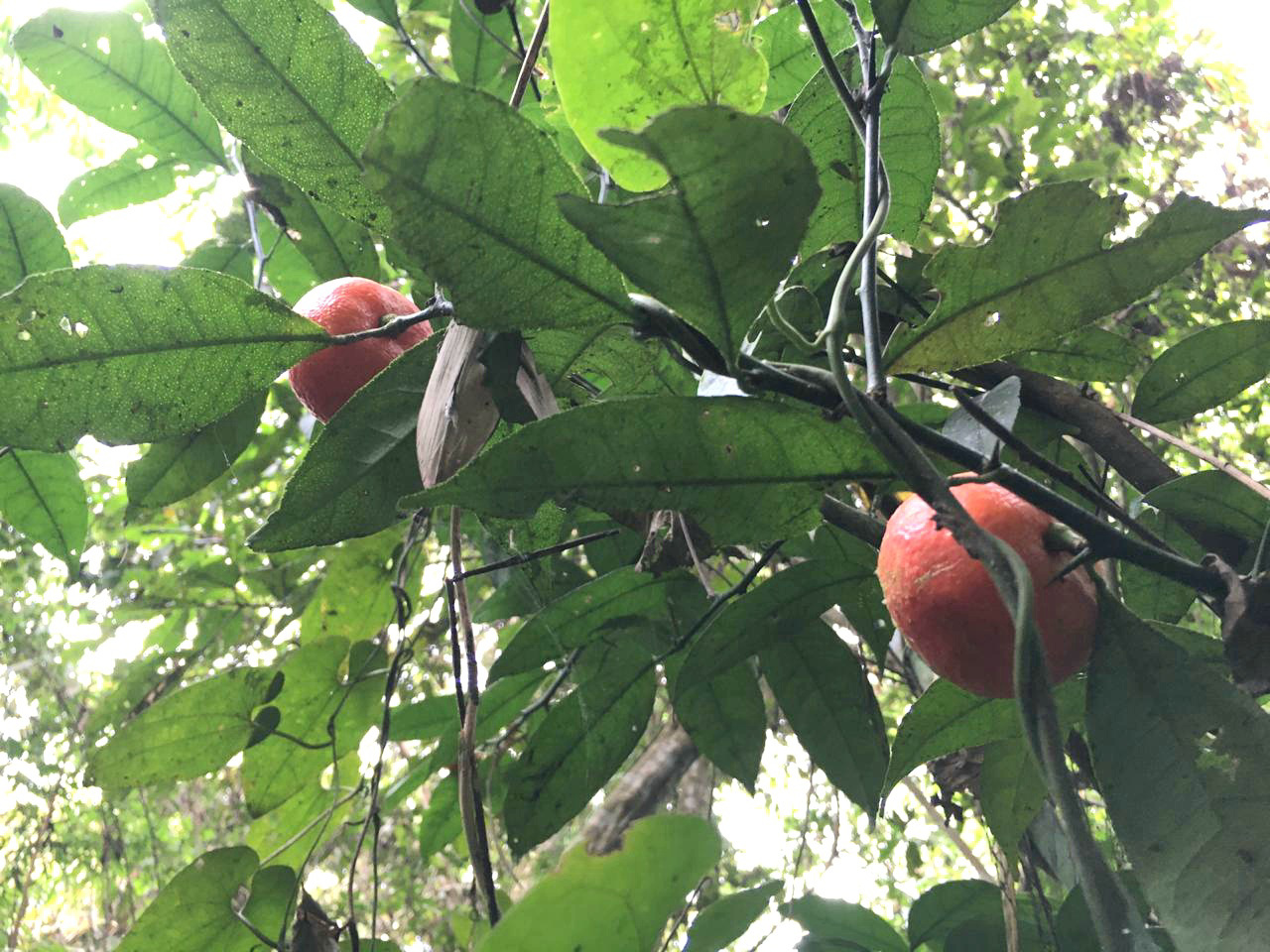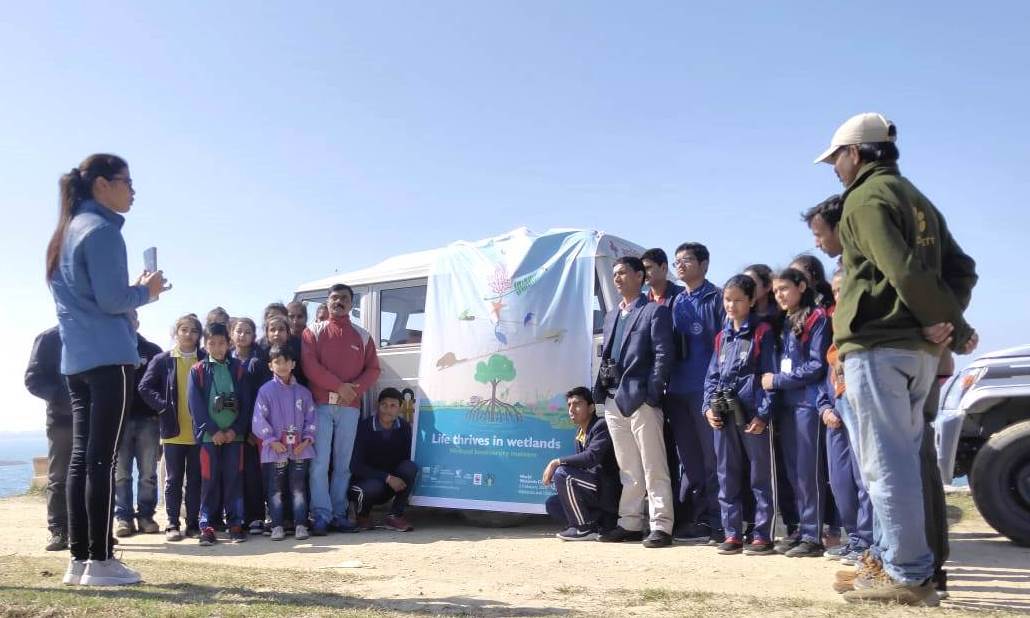|
THE CORBETT FOUNDATION NEWSLETTER
February & March 2020 |
|
|
The Corbett Foundation stands in support of the fight against COVID-19. We urge everyone to exercise caution and take utmost care of self and family in fighting off this deadly disease and safely overcome these unprecedented times. We strongly recommend that we all follow the health advisories issued by the World Health Organisation and the Government of India in combating this disease.
Be Safe, Take care. |
|
|
IN MEMORY
SHARAD KUMAR SANGHI
29 August 1942 - 21 February 2020
Mr. Sharad Kumar Sanghi, Trustee of The Corbett Foundation, Chairman of Sanghi Brothers (Indore) Pvt. Ltd. and former Member of Madhya Pradesh State Wildlife Advisory Board, left for his heavenly abode on February 21, 2020.
He was a passionate nature lover and a longtime believer in The Corbett Foundation. He donated generously to various projects and completely sponsored the construction of an award winning Tribal Museum near Kanha. Due to his tremendous experience as well as compassion, he played a valuable role in planning, strategising and implementing of the Foundation's programmes. Mr. Sanghi was known for his good sense of humour and his contagious laughter, being able to put a smile on everyone’s face.
All of us at The Corbett Foundation deeply mourn his passing and offer our deepest condolences to his family.
We will miss him.
|
|
|
|
 |
A permanent ban on wildlife trade is the need of the hour
The world is going through COVID-19 pandemic that has affected almost 700,000 people all over the world. COVID-19 is a zoonotic disease and is believed to have transmitted to humans in the live animal markets of Wuhan city in China. The scientists studying this virus have suggested that this new coronavirus was transmitted from bats to humans through intermediate hosts such as pangolins or civets or snakes. While experts are studying its epidemiology, one thing that has very strongly emerged is the close link of the COVID-19 pandemic to the wildlife trade and wild meat consumption in countries such as China. The conservationists from across the world have been voicing their concerns over the growing wildlife trade and to end this consumption. But these markets flourished unabated. Finally, NATURE retaliated and a microorganism compelled China to ban the wild animal consumption and farming in the country. Vietnam too has followed China's footsteps and is taking steps to ban the billion dollar wildlife trade in the country. Hopefully, these measures are strictly enforced as these decision will also have a positive effect on curtailing the illegal wildlife trade and consumption in India, especially the in the northeastern states where pangolins, lorises, geckos and many other species are consumed, traded and supplied across the border through Myanmar to Vietnam and other southeast Asian countries.
Pangolins are the worst affected creatures due to this wildlife trade. The two species found in India - Indian Pangolin (
Manis crassicaudata) and Chinese Pangolin (
Manis pentadactyla) - are hunted for their meat and poached for their scales to be supplied in illegal wildlife trade. In March 2020, The Corbett Foundation and Rainforest Club Tamenglong along with Manipur Forest Department rescued a Chinese Pangolin from a local. The pangolin was highly stressed. It was released after couple of days in the nearby forest. We appreciate this gesture and the fact that awareness about these issues is increasing. However, the sheer magnituide of illegal wildlife trade is massive and deep rooted, and hence would need herculean efforts to eradicate this completely from India and the rest of the world. Demand in the market will trigger the supply. When the demand stops, the supply chain will be broken and will eventually stop too. a
We hope that the world has learnt a lesson from COVID-19 pandemic and thus a better ecological sense prevails.
|
|
|
|
Great Indian Bustard and Bengal Florican in Appendix I of the CMS
The Government of India’s proposals to include the Great Indian Bustard (
Ardeotis nigriceps) and the Bengal Florican (
Houbaropsis bengalensis) in Appendix I during the Thirteenth Session of the Conference of the Parties to the Convention on the Conservation of Migratory Species of Wild Animals (CMS COP13) were unanimously approved. These inclusions will ensure to address the trans-boundary conservation issues of these two Critically Endangered species epitomising the dry and wet grasslands of India, respectively. A huge thanks to the Government of India for these proposals and to all the countries and organisations that supported these proposals at the CMS COP13. The Corbett Foundation was honoured to have presented its statement in support of the Great Indian Bustard’s inclusion in Appendix I of the CMS. This can be viewed at the link https://youtu.be/mwNCCwocIEw.
|
|
|
|
The Final Flight: Conserving Eurasia’s Iconic Bustard Species
CMS CoP13 in Gandhinagar, Gujarat, saw a side event and panel discussion on ‘The Final Flight: Conserving Eurasia’s Iconic Bustard Species’ to spread awareness about the remaining species of the bird and their conservation through CMS. The event held on February 20th, was jointly organized by The Corbett Foundation, Eurasian Bustard Alliance and Wildlife Conservation Society – India. The Side Event titled ‘The Final Flight: Conserving Eurasia’s Iconic Bustard Species’ featured a panel of experts from around the world speaking on four different bustard species – the Great Indian Bustard, the Bengal Florican, the Little Bustard (
Tetrax tetrax) and the Great Bustard (
Otis tarda), threats to their survival and the need for conservation efforts to be ramped up.
For more details about this event, please read further here.
|
|
|
|
Transition to eco-friendly stoves in Kanha Tiger Reserve
The Corbett Foundation, with the kind support of PricewaterCoopers (PwC) India Foundation, has launched its project ‘Healthy Forests, Healthy People’ in Kanha Tiger Reserve. A total of 900 households from 14 villages would be provided energy-efficient portable cookstoves designed by NEERI. These cookstoves reduce the usage of firewood by around 40-50%. This project will ensure reduction in the collection of firewood from forest and ensuring better health of women due to reduced smoke. In addition, habitat restoration work also forms an integral part of this project that TCF will work closely with Kanha Tiger Reserve.
TCF thanks PwC India Foundation for their support towards this project. Special thanks to the wonderful team of Kanha Tiger Reserve for the support and partnership.
|
|
|
|
 |
World Wildlife Day celebration in Kaziranga
The Corbett Foundation and Kaziranga National Park jointly organised an event to celebrate the World Wildlife Day. The theme of this year's celebration was 'sustaining all life on earth'.
On 20 December 2013, at its 68th session, the United Nations General Assembly decided to proclaim 3 March, the day of the adoption of the Convention on International Trade in Endangered Species of Wild Fauna and Flora (CITES) in 1973, as World Wildlife Day. Thereafter, every year the 3rd day of March is celebrated worldwide as Wildlife Day to celebrate and raise awareness of the world’s wild animals and plants.
Five schools around Kaziranga, teachers, artists, media representatives, the frontline staff of KNP with their officers and TCF's team organised a series of activities in the park. The students experienced the wildlife in the central range of Kaziranga. They were briefed about the diverse flora and fauna of the park. Beautiful greeting cards were designed by the students, taking help from what they saw in the park. Some of the cards made by the students reflected pain and suffering of wild animals while some depicted the pain which the community goes through. A wildlife photo exhibition organised by TCF was highly appreciated by the students. Shri Ramesh Gogoi, DFO, Eastern Assam Wildlife Division interacted with the students.
Tourists too flocked the event site at Mihimukh as they were leaving from the park after the safari, and interacted with the students. The students gifted their greeting cards to the tourists and thanked them for visiting Kaziranga. It is important to highlight the link between wildlife conservation and sustainable ecotourism. Students from the fringe villages are ambassadors of the goodwill generated by the park through ecotourism. Their engagement will result in a healthy relationship of the local community and park management. Students will shape the attitude of future generations for wildlife.
An American tourist revealed that she hadn't seen this kind of initiative to connect students and tourists in her three decades of visiting wildlife parks across the world.
|
|
|
|
|
|
Bajaj Saksham Programme
Only a healthy mind and body can appreciate and understand the need for the conservation of wildlife.TCF operates a total of five dedicated mobile medical units to cover around 350-odd villages from around the tiger reserves of Corbett, Kanha and Bandhavgarh, Kanha-Pench Corridor. Most of the villages in the above areas are remotely located and access to any medical aid is often very difficult. TCF provides primary healthcare and treatment facilities at village level along with on-the-spot pathological and diagnostics tests and awareness among the local communities on personal hygiene, handwash campaign and various other disease prevention sessions in schools and among the village community. TCF is grateful to Bajaj Auto Ltd. for their valuable support to this programme since 2016.
|
|
|
|
 |
Wild Oranges in Tamenglong's forest
The Corbett Foundation’s project titled Systematic Rejuvenation of Indian Jungles And Nature (SRIJAN), supported by Axis Bank Foundation, has been exploring the valley beyond Azuram village which overlooks the Barak River in Tamenglong district of Manipur. Azuram village has a community forest reserve which is protected and looked after by the community. TCF has been implementing forest conservation by generating alternative livelihoods such as beekeeping.
During the last month’s biodiversity assessment fieldwork, TCF’s SRIJAN team and volunteers identified Indian wild orange (
Citrus indica) in Azuram’s community reserve forest. Northeast India is a potential region for the genetic diversity of Citrus genus with 17 species of Citrus being attributed to having originated in the region. Indentified in 1928,
C. indica is considered to be the most primitive species and probably it is the progenitor of farmed Citrus. This plant is an endemic species of the northeastern states Assam, Manipur, Meghalaya Nagaland, and Myanmar. Habitat destruction due to large scale jhum cultivation in northeast India is considered to be the crucial threat for this species.
The Biodiversity Heritage Site at Dailong village in Tamenglong has also revealed the presence of Indian wild orange before it was declared a heritage site. The declaration of the site as a Biodiversity Heritage Site has helped protect the species in the area. There is a need to undertake more systematic surveys and studies in other areas and establishing community-managed reserve forests will help in better protection of this and other endemic species in the region.
|
|
|
|
 |
World Wetlands Day celebrated in Corbett
On the occasion of World Wetlands Day 2020, The Corbett Foundation organised an awareness programme in Tumariya Dam with the students of Govt. Inter College, Dhikuli. Activities started with educating them about importance of wetlands and impact of climate change on them. The children participated in waterfowl identification and bird watching session on Tumariya reservoir, followed by a short quiz competition between the two schools which the children participated with full enthusiasm. The day ended with an award ceremony for the winners of the quiz and a token of appreciation for the teachers of the respective schools.
The Corbett Foundation has been monitoring winter migrants in Haripura, Baur and Tumaria reservoirs in Corbett Landscape for more than 15 years. Haripura and Baur reservoirs are located in Terai-Central Forest Division whereas Tumaria reservoir is located in Terai-West Forest Division. Based on the information collected, reports and research papers have been published and submitted to the concerned forest department, Bombay Natural History Society, and other institutions focusing on conservation of wetlands and migratory waterfowls, from time to time.
|
|
|
|
|
SCIENTIFIC ADVISORS
Dr. AJT Johnsingh and Dr. Asad R. Rahmani
|
|
|
The Corbett Foundation is a charitable trust registered under the Indian Trusts Act, 1882. It is also registered under the Foreign Contribution (Regulation) Act, 1976 under registration number 231650853. The donations to The Corbett Foundation are tax exempt u/s 80G of the Income Tax Act, 1961. The Corbett Foundation is accredited by Credibility Alliance under the Desirable Norms prescribed for Good Governance of Voluntary Organisations.
NITI Aayog ID: UA/2017/0179126 |
|
|
| |
| |
|
|
 | | | | | |
|  |
|
|
|
|


